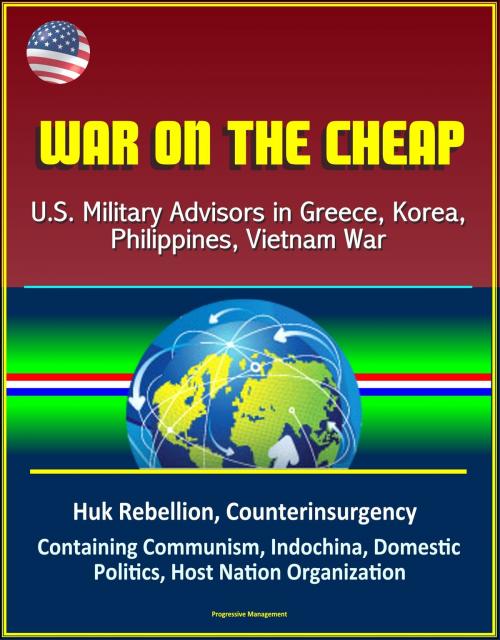War on the Cheap: U.S. Military Advisors in Greece, Korea, Philippines, Vietnam War - Huk Rebellion, Counterinsurgency, Containing Communism, Indochina, Domestic Politics, Host Nation Organization
Nonfiction, History, Military, Vietnam War, Asian, United States| Author: | Progressive Management | ISBN: | 9781311652942 |
| Publisher: | Progressive Management | Publication: | January 10, 2017 |
| Imprint: | Smashwords Edition | Language: | English |
| Author: | Progressive Management |
| ISBN: | 9781311652942 |
| Publisher: | Progressive Management |
| Publication: | January 10, 2017 |
| Imprint: | Smashwords Edition |
| Language: | English |
This excellent report has been professionally converted for accurate flowing-text e-book format reproduction. Following the Second World War, the United States assumed the mantle of world leadership from Great Britain and faced two concurrent pressures on the world order: communism and anti-colonialism. Confronted with the responsibility of containing the global menace, President Harry Truman promised U.S. military advice and assistance to free nations fighting against oppression.
An analysis of the U.S. advisory missions in Greece, Korea, and the Philippines shows a pattern of perceived success that overshadowed the operational and strategic environments in which these missions took place. This pattern contributed to a misguided belief that advisors would be sufficient to fix South Vietnam's fundamental flaws. Unable to persuade South Vietnam to implement changes that would make it more effective, but unwilling to walk away, Washington stayed the advisory course in Vietnam when all signs were pointing toward its inability to affect the internal situation's most critical elements. In Vietnam, the United States discovered that the model it had previously tested—and perhaps thought perfected—failed in the face of the most motivated anti-colonialist communist foe it faced during the Cold War. This paper challenges the contemporary mythology of America's early advisory efforts and the true efficacy of advisors in general.
CHAPTER I - INTRODUCTION * A. ADVISOR OVERVIEW * B. PROBLEMS AND HYPOTHESES * C. LITERATURE REVIEW * 1. Cold War * 2. Military Advising and Counterinsurgency * 3. Greek Civil War * 4. Korean Conflict * 5. Philippine Hukbalahap Insurrection * 6. Vietnam Conflict * D. OVERVIEW * CHAPTER II - U.S. MILITARY ADVISORS IN GREECE: THE BIRTH OF CONTAINMENT * A. FROM BRITISH OCCUPATION TO THE TRUMAN DOCTRINE * B. BELLIGERENTS * 1. Greek Communists * 2. Greek Nationalists * C. BATTLEGROUND * D. ACT I: U.S. INVOLVEMENT - DOLLARS AND SENSE * E. ACT II: GENERAL JAMES VAN FLEET TAKES OVER * F. DEMOCRATIC ARMY MISTAKES * G. ACT III: THE FINAL PUSH * CHAPTER III - U.S. MILITARY ADVISORS IN KOREA: BACKING INTO CONTAINING COMMUNISM * A. FROM JAPANESE OCCUPATION TO COLD WAR DIVISION * B. BELLIGERENTS * 1. North Korean Communists * 2. South Korean Nationalists * 3. Chinese Communists * C. BATTLEGROUND * D. CREATING A KOREAN SECURITY APPARATUS * 1. Communist Insurgency * 2. Growing Threat * E. WAR COMES TO SOUTH KOREA * F. REBUILDING THE ROKA * G. CONCLUSION * CHAPTER IV - U.S. MILITARY ADVISORS IN THE PHILIPPINE HUK INSURRECTION: THE POWER OF THE INDIVIDUAL * A. ROOTS OF HUK DISCONTENT * B. BELLIGERENTS * 1. Hukbalahaps * 2. Philippine Government Forces * C. BATTLEGROUND * D. POSTWAR UNREST * E. DEBATE OVER U.S. INVOLVEMENT IN THE PHILIPPINES * F. RAMON MAGSAYSAY * G. EDWARD LANSDALE * H. HUK ERRORS * I. THE MAGSAYSAY MIRACLE * J. CONCLUSION * CHAPTER V - U.S. MILITARY ADVISORS IN INDOCHINA: DRAGGED INTO THE FRENCH MORASS * A. FROM LIBERATION TO U.S. INVOLVEMENT * B. AMERICAN FRUSTRATION AND FRENCH DISASTER * CHAPTER VI - U.S. MILITARY ADVISORS IN VIETNAM: FROM FRENCH MORASS TO U.S. QUAGMIRE, PART ONE * A. THE UNITED STATES TAKES OVER: ANALYSIS PARALYSIS * B. ADVISOR HONEYMOON PERIOD IN VIETNAM * CHAPTER VII - U.S. MILITARY ADVISORS IN VIETNAM: TRADING A FRENCH MORASS FOR A U.S. QUAGMIRE, PART TWO * A. VIETNAMESE COMMUNIST RESURGENCE * B. THE ADVISORY EFFORT ROLLS ON * C. DIEM'S EFFORTS TO STABILIZE THE SOUTH * D. CONVENTIONAL COUNTERINSURGENCY * E. THE OVERTHROW OF DIEM * F. DIEM: CAN'T WIN WITH HIM, CAN'T WIN WITHOUT HIM * G. CONCLUSION * CHAPTER VIII - CONCLUSION * A. FACTORS AFFECTING ADVISING * 1. Will * 2. Leadership * 3. Actions and Influence of the Senior Advisor * 4. Physical Terrain and Political Geography * 5. External Support * 6. Host Nation Government * 7. U.S. Domestic Politics: Advice Is Free. Advisory Missions Are Not * 8. Civil-Military Teamwork
This excellent report has been professionally converted for accurate flowing-text e-book format reproduction. Following the Second World War, the United States assumed the mantle of world leadership from Great Britain and faced two concurrent pressures on the world order: communism and anti-colonialism. Confronted with the responsibility of containing the global menace, President Harry Truman promised U.S. military advice and assistance to free nations fighting against oppression.
An analysis of the U.S. advisory missions in Greece, Korea, and the Philippines shows a pattern of perceived success that overshadowed the operational and strategic environments in which these missions took place. This pattern contributed to a misguided belief that advisors would be sufficient to fix South Vietnam's fundamental flaws. Unable to persuade South Vietnam to implement changes that would make it more effective, but unwilling to walk away, Washington stayed the advisory course in Vietnam when all signs were pointing toward its inability to affect the internal situation's most critical elements. In Vietnam, the United States discovered that the model it had previously tested—and perhaps thought perfected—failed in the face of the most motivated anti-colonialist communist foe it faced during the Cold War. This paper challenges the contemporary mythology of America's early advisory efforts and the true efficacy of advisors in general.
CHAPTER I - INTRODUCTION * A. ADVISOR OVERVIEW * B. PROBLEMS AND HYPOTHESES * C. LITERATURE REVIEW * 1. Cold War * 2. Military Advising and Counterinsurgency * 3. Greek Civil War * 4. Korean Conflict * 5. Philippine Hukbalahap Insurrection * 6. Vietnam Conflict * D. OVERVIEW * CHAPTER II - U.S. MILITARY ADVISORS IN GREECE: THE BIRTH OF CONTAINMENT * A. FROM BRITISH OCCUPATION TO THE TRUMAN DOCTRINE * B. BELLIGERENTS * 1. Greek Communists * 2. Greek Nationalists * C. BATTLEGROUND * D. ACT I: U.S. INVOLVEMENT - DOLLARS AND SENSE * E. ACT II: GENERAL JAMES VAN FLEET TAKES OVER * F. DEMOCRATIC ARMY MISTAKES * G. ACT III: THE FINAL PUSH * CHAPTER III - U.S. MILITARY ADVISORS IN KOREA: BACKING INTO CONTAINING COMMUNISM * A. FROM JAPANESE OCCUPATION TO COLD WAR DIVISION * B. BELLIGERENTS * 1. North Korean Communists * 2. South Korean Nationalists * 3. Chinese Communists * C. BATTLEGROUND * D. CREATING A KOREAN SECURITY APPARATUS * 1. Communist Insurgency * 2. Growing Threat * E. WAR COMES TO SOUTH KOREA * F. REBUILDING THE ROKA * G. CONCLUSION * CHAPTER IV - U.S. MILITARY ADVISORS IN THE PHILIPPINE HUK INSURRECTION: THE POWER OF THE INDIVIDUAL * A. ROOTS OF HUK DISCONTENT * B. BELLIGERENTS * 1. Hukbalahaps * 2. Philippine Government Forces * C. BATTLEGROUND * D. POSTWAR UNREST * E. DEBATE OVER U.S. INVOLVEMENT IN THE PHILIPPINES * F. RAMON MAGSAYSAY * G. EDWARD LANSDALE * H. HUK ERRORS * I. THE MAGSAYSAY MIRACLE * J. CONCLUSION * CHAPTER V - U.S. MILITARY ADVISORS IN INDOCHINA: DRAGGED INTO THE FRENCH MORASS * A. FROM LIBERATION TO U.S. INVOLVEMENT * B. AMERICAN FRUSTRATION AND FRENCH DISASTER * CHAPTER VI - U.S. MILITARY ADVISORS IN VIETNAM: FROM FRENCH MORASS TO U.S. QUAGMIRE, PART ONE * A. THE UNITED STATES TAKES OVER: ANALYSIS PARALYSIS * B. ADVISOR HONEYMOON PERIOD IN VIETNAM * CHAPTER VII - U.S. MILITARY ADVISORS IN VIETNAM: TRADING A FRENCH MORASS FOR A U.S. QUAGMIRE, PART TWO * A. VIETNAMESE COMMUNIST RESURGENCE * B. THE ADVISORY EFFORT ROLLS ON * C. DIEM'S EFFORTS TO STABILIZE THE SOUTH * D. CONVENTIONAL COUNTERINSURGENCY * E. THE OVERTHROW OF DIEM * F. DIEM: CAN'T WIN WITH HIM, CAN'T WIN WITHOUT HIM * G. CONCLUSION * CHAPTER VIII - CONCLUSION * A. FACTORS AFFECTING ADVISING * 1. Will * 2. Leadership * 3. Actions and Influence of the Senior Advisor * 4. Physical Terrain and Political Geography * 5. External Support * 6. Host Nation Government * 7. U.S. Domestic Politics: Advice Is Free. Advisory Missions Are Not * 8. Civil-Military Teamwork















